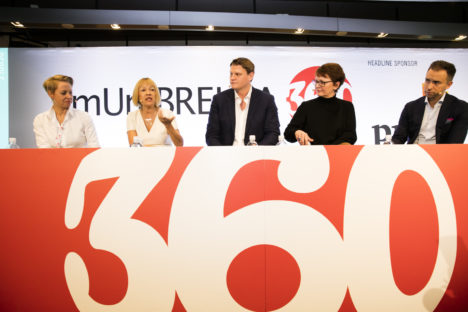Cindy Gallop swamped with ‘appalling’ stories of sexual harassment in Australian ad industry
Cindy Gallop, the former APAC boss of ad network BBH and now an outspoken gender diversity campaigner, has been swamped by Australian women with “appalling” reports of sexual harassment as she warned the issue has now become “endemic” with agencies covering up cases to avoid negative publicity.
“I’ve had numerous emails from women in the Australian ad industry as well as women in the industry around the world telling me appalling stories that they are too scared to say out loud to the ad industry here, to the media, and those stories involved sexual harassment, abuse and retaliation, and the impossibility of pursuing the creative careers they love and want as passionately as every single one of you men did,” Gallop said on a panel on diversity at the Mumbrella 360 conference.

L-r: Dr Jennifer Whelan, Cindy Gallop, Alex Hayes, Lorraine Jokovic and Simon Rya
Gallop also said that sexual discrimination was a major reason women were leaving the industry.


Actually, as it happens – a work colleague was sexually harassed at a mUmbrella360 evening event last week – so we can report from the frontlines that this kind of behaviour is well and truly alive in the Australian ad industry.
It’s disgusting and disappointing that women feel under attack in the workplace in this day and age.
Hi anon,
I’m sorry to hear that.
By “evening event”, I presume you mean the drinks party for delegates hosted at the Arthouse Hotel on the first night of the conference. If you could encourage your colleague to let me know what occurred, I’d be keen to look into it, and will of course be happy to treat their details in confidence.
tim@mumbrella.com.au
Cheers,
Tim – Mumbrella
Thanks for getting back to us so quickly Tim. Obviously the incident is no reflection at all on mUmbrella360 or the calibre of the events. That said, my colleague will drop you a line shortly.
Cindy, I support your base line with all my heart, yet I believe you are building a new house with very old bricks here.
Mountains of accusation, very little real evidence, mountains of cure with very little diagnosis of the disease. Men and women, and yes, all those non asexual combinations and fancies in between, are sexual beings with a sexual agenda, as well as the corporate or business one which is wrapped around the genuine human article.
I can understand your stance as a polemic, as a crushing political tool, but beyond that, it risks becoming a destructive and blunt battering ram.
The phenomenon that Dylan Thomas referred to as “The force that through the green fuse drives the flower” is a force to be borne by us all; it is, for a time, more important in the scheme of things than almost anything else. Sadly it becomes derisive, as the flower wilts, and we find ourselves neglected by its needs.
If someone steals your handbag do you run home and sulk? Send an email to to a public voice? or shout “stop thief”?